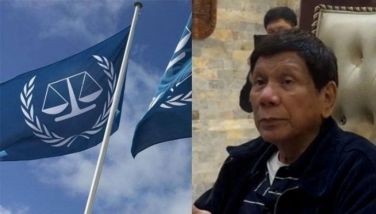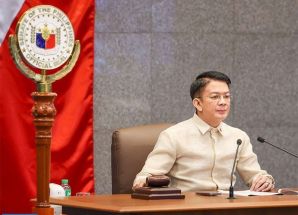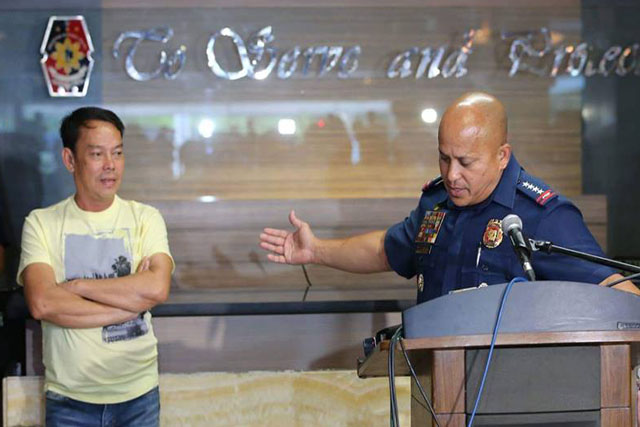Command responsibility

This is the first time indeed in our country’s history that an overwhelming number of Filipinos have lost not only their trust on, but also their respect for their president. And these are largely due to the actuations and pronouncements of Benigno Aquino III, whom we have supposedly elected as President in 2010, immediately before, during and right after the Board of Inquiry (BOI) came out with its fact finding report on the Mamasapano massacre.
The overwhelming public perception is that he has been trying to extricate himself from, or refusing to accept any responsibility for the brutal killing of the 44 SAF commandos last Jan. 25, 2015. And in doing so, he has obviously lied and/or contradicted himself a number of times. But the most disgusting and even shocking was his recent declaration in anticipation of the damaging BOI report, that binola siya ni Purisima at Napenas (Purisima and Napenas fooled or deceived him). It is hard to imagine or even beyond the stretch of imagination that subordinates could commit such deception and disrespect to the President of this country who is supposed to instill respect and even fear for being the most powerful official of the land with all the resources at his command. With this recent admission, a lot of people have indeed lost whatever respect they still have not only for P-Noy as a person but also for the position of President that he holds.
More shocking and disgusting is his reaction to the BOI report which found among others that he has broken the chain of command in the PNP hierarchy. While he has been previously telling us to await the report before making any conclusions, he has completely somersaulted and assailed the report because it is damaging to him. He has even unleashed his Secretary of Justice to dispute this finding of the BOI by declaring that there is no chain of command in the Philippine National Police (PNP) because it is purely a civilian agency and not part of the Armed Forces or the military where the chain of command rule applies.
P-Noy must have been visibly hurt by the BOI report because he lost no time in summoning the head of the BOI to Malacanang last Wednesday afternoon. To most people, such meeting was no longer necessary especially because the BOI and its members have publicly professed that they are standing by its findings and would not change them. Unfortunately, the meeting still pushed through and Magalong appeared to have succumbed to some pressure as he made a “clarification” of the report and announced that the BOI did not attribute any wrongdoing to P-Noy and that they never mentioned he violated the chain of command.
This latest “clarification” by the BOI head somehow casts a long shadow of doubt over the integrity and credibility of its report. The report now appears to be contradictory to the Senate committee report finding P-Noy “ultimately responsible” which was initially perceived to coincide with it. Indeed the latest pronouncement of Magalong is no longer a finding of fact but his own conclusion of fact which is beyond the function of the BOI. This clarification somehow gives credence to the observation that there are as many truths as there are inquiries. So expect another “truth” from the results of the investigation conducted by the Department of Justice and the MILF which will be submitted to Malaysia and not to the Filipino people.
It must be pointed out in this connection that the BOI and the other inquiries being conducted are merely fact finding. They are not supposed to give any judgment or conclusion as to the liability or accountability of any of the major players in this gory incident. They are just conducted for purposes of prosecuting and eventually determining their guilt or innocence by the court of competent jurisdiction.
At any rate, the main issue here is not actually whether the chain of command has been broken. Breaking the chain of command mainly involves disregarding the link in the hierarchy of the position from top to bottom. But the more important rule to consider here is the principle of command responsibility. In this connection, the Supreme Court in the case of Saez vs. Macapagal-Arroyo (G.R. 183533, February 25, 2012) has already laid down the rule on the command responsibility of the president. The court said that the following element must obtain to hold someone liable under the doctrine of command responsibility:
1. The existence of superior-subordinate relationship between him and the perpetrator of the act of omission;
2. The superior knew or had reason to know that the act or omission was about to be or had been committed or omitted;
3. The superior failed to take the necessary and reasonable measures to prevent the act or omission or punish the perpetrator.
The president being the commander-in-chief of all the armed forces qualifies him as a superior within the purview of command responsibility.
On the issue of knowledge, it must be pointed out that… in the Philippines, a more liberal view is adopted and superiors may be charged with constructive knowledge. This view is buttressed by the enactment of Executive Order No. 226 otherwise known as the Institutionalization of the Doctrine of “Command Responsibility” in all Government Offices, particularly at all levels of Command in the Philippine National Police and other Law Enforcement Agencies.
Under E.O. 226, a government official may be held liable for neglect of duty under the doctrine of command responsibility if he has knowledge that a crime or offense shall be committed, is being committed or has been committed by his subordinates or by others within the area of responsibility and, despite such knowledge, he did not take preventive or corrective action either before, during or immediately after its commission.
As to the issue of failure to prevent or punish, it is important to note that as commander-in-chief of the armed forces the president has the power to effectively command, control and discipline them.
Based on this ruling and on the facts found by the BOI and the Senate, it would appear that P-Noy is indeed ultimately responsible.
* * *
Email: attyjosesison@gmail.com
- Latest
- Trending



























